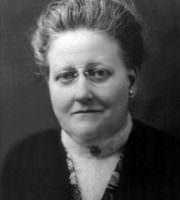by Marietta Holley
High on a rocky cliff did once a gray old castle stand,
From whence rough-bearded chieftains led their vassals--ruled the land.
For centuries had dwelt here sire and son, till it befell,
Last of their ancient line, two brothers here alone did dwell.
The eldest was stern-visaged, but the youngest smooth and fair
Of countenance; both zealous, men who bent the knee in prayer
To God alone; loved much, read much His holy word,
And prayed above all gifts desired, that they might see their Lord.
For this the elder brother carved a silent cell of stone,
And in its deep and dreary depths he entered, dwelt alone,
And strove with scourgings, vigils, fasts, to purify his gaze,
And sought amidst these shadows to behold the Master's face.
And from the love of God that smiles on us from bright lipped flowers,
And from the smile of God that falls in sunlight's golden showers,
That thrills earth's slumbering heart so, where its warm rays fall
That it laughs out in beauty, turned he as from tempters all.
From bird-song running morn's sweet-scented chalice o'er with cheer,
The child's light laughter, lifting lowliest souls heaven near,
From tears and glad smiles, linked light and gloom of the golden day,
He counting these temptations all, austerely turned away.
And thus he lived alone, unblest, and died unblest, alone,
Save for a brother monk, who held the carved cross of stone
In his cold, rigid clasp, the while his dying eyes did wear
A look of mortal striving, mortal agony, and prayer.
Though at the very last, as his stiff fingers dropped the cross,
A gleam as from some distant city swept his face across,
The clay lips settled into calm--thus did the monk attest,
A look of one who through much peril enters into rest.
Not thus did he, the younger brother, seek the Master's face;
But in earth's lowly places did he strive his steps to trace,
Wherever want and grief besought with clamorous complaint,
There he beheld his Lord--naked, athirst, and faint.
And when his hand was wet with tears, wrung with a grateful grasp,
He lightly felt upon his palm the Elder Brother's clasp;
And when above the loathsome couch of woe and want bent he,
A low voice thrilled his soul, "So have ye done it unto Me."
Despised he not the mystic ties of blood, yet did he claim
The broader, wider brotherhood, with every race and name;
To his own kin he kind and loyal was in truth, yet still,
His mother and his brethren were all who did God's will
All little ones were dear to him, for light from Paradise
Seemed falling on him through their pure and innocent eyes;
The very flowers that fringed cool streams, and gemmed the dewy sod,
To his rapt vision seemed like the visible smiles of God.
The deep's full heart that throbs unceasing against the silent ships,
The waves together murmuring with weird, mysterious lips
To hear their untranslated psalm, drew down his anointed ear,
And listening, lo! he heard God's voice, to Him was he so near.
The happy hum of bees to him made summer silence sweet,
Not lightly did he view the very grass beneath his feet,
It paved His presence-chamber, where he walked a happy guest,
Ah! slight the veil between, in very truth his life was blest.
And when on a still twilight passed he to the summer land,
Those whom he had befriended, weeping, clinging to his hand,
The west gleamed with a sudden glory, and from out the glow
Trembled the semblance of a crown, and rested on his brow.
And with wide, eager eyes he smiled, and stretched his hands abroad,
As if his dearest friend were welcoming him to his abode;
Eternal silence sealed that wondrous smile as he cried--
"Thy face! Thy face, dear Lord!" and, saying this, he died.
But legends tell that on his grave fell such a strange, pure light,
That wine-red roses planted thereupon would spring up white,
Holding such mystic healing in their cool snow bloom, that lain
On aching brows or sorrowful hearts, they would ease their pain.





